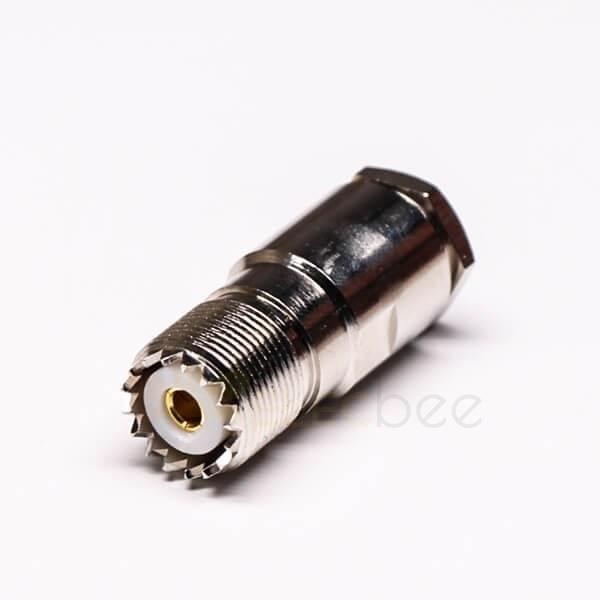Разъемы УВЧ, также известные как разъемы «PL-259» и «SO-239», обычно используются в радиочастотных (РЧ) приложениях. Они известны своей долговечностью, низкой стоимостью и простотой использования. В этой статье мы рассмотрим, что такое разъемы УВЧ, как они работают и некоторые распространенные приложения для них.
Что такое УВЧ-разъем?
Аразъем УВЧявляется типомкоаксиальный разъемиспользуется в радиочастотных приложениях. Он предназначен для работы в диапазоне сверхвысоких частот (УВЧ), который охватывает частоты от 300 МГц до 3 ГГц. Соединитель состоит из внешнего проводника с резьбой и центрального штифта, окруженного изолятором.
Одним из наиболее распространенных типов разъемов УВЧ является разъем PL-259, который используется для подключения коаксиальных кабелей к антеннам, усилителям и другому радиочастотному оборудованию. Разъем SO-239 является гнездовой версией PL-259 и обычно используется на стороне оборудования соединения.

Как работают разъемы УВЧ?
Соединители UHF работают, создавая соединение между внешним проводником соединителя и внешним проводником коаксиального кабеля. Центральный контакт разъема контактирует с центральной жилой кабеля. Это создает непрерывный электрический путь между кабелем и оборудованием, к которому он подключен.
Резьбовая конструкция внешнего проводника помогает создать надежное соединение между разъемом и оборудованием. Резьба спроектирована так, чтобы быть самоблокирующейся, что означает, что она не ослабнет со временем из-за вибрации или других факторов.
Одним из преимуществ разъемов UHF является их способность работать с высокими уровнями мощности. Это делает их идеальными для использования в радиочастотных приложениях, где требуются высокие уровни мощности, например, в радиовещании и военной связи.
Общие области применения разъемов УВЧ
Разъемы UHF обычно используются в различных радиочастотных приложениях, в том числе:
- Антенны: разъемы UHF часто используются для подключения антенн к радиоприемникам, усилителям и другому радиочастотному оборудованию. Они идеально подходят для этого приложения, поскольку обеспечивают безопасное и надежное соединение, способное выдерживать высокие уровни мощности.
- Усилители: разъемы УВЧ также используются для подключения ВЧ-усилителей к антеннам и другому оборудованию. Они идеально подходят для этого применения, поскольку могут работать с высокими уровнями мощности, которые часто требуются усилителям.
- Радио: разъемы UHF используются для подключения радиостанций к антеннам и другому оборудованию. Они идеально подходят для этого приложения, поскольку обеспечивают безопасное и надежное соединение, способное выдерживать высокие уровни мощности.
- Испытательное оборудование: разъемы УВЧ обычно используются в тестовом оборудовании, таком как анализаторы спектра и генераторы сигналов. Они идеально подходят для этого приложения, поскольку обеспечивают безопасное и надежное соединение, способное выдерживать высокие уровни мощности.
Техническое обслуживание и уход за разъемом УВЧ
Чтобы разъемы УВЧ продолжали нормально функционировать, важно заботиться о них и проводить регулярное техническое обслуживание. Вот несколько советов по обслуживанию и уходу за разъемами УВЧ:
- Регулярно проверяйте разъемы на наличие признаков износа и повреждений. Ищите признаки коррозии, ржавчины или других повреждений, которые могут повлиять на работу разъема.
- Регулярно очищайте разъемы от грязи, пыли и прочего мусора. Используйте мягкую ткань и слабый чистящий раствор, чтобы аккуратно очистить разъемы.
- Осмотрите разъемы на правильность совмещения. Убедитесь, что центральный контакт разъема правильно совмещен с центральным проводником коаксиального кабеля.
- Надежно затяните разъемы. Убедитесь, что резьба разъема затянута должным образом, чтобы обеспечить безопасное и надежное соединение.
Заключение
Разъемы UHF являются важным компонентом во многих радиочастотных приложениях. Они известны своей долговечностью, низкой стоимостью и простотой использования. Понимая, как работают разъемы УВЧ и как за ними ухаживать, вы можете обеспечить правильную и надежную работу вашего радиочастотного оборудования. Независимо от того, используете ли вы разъемы УВЧ для антенн, усилителей, радиоприемников или тестового оборудования, они обеспечивают безопасное и надежное соединение, способное выдерживать высокие уровни мощности.






